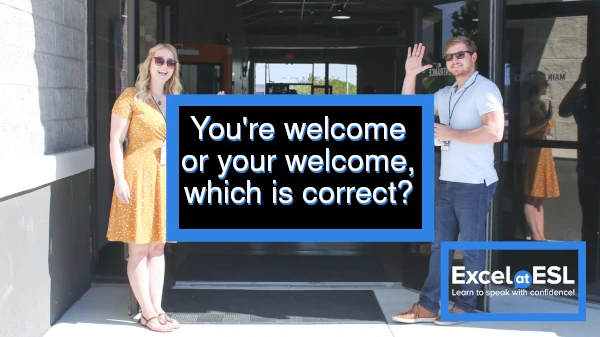English grammar can be difficult at times. There are rules to remember, but for every rule there seems to be an exception. Other times, you’ll come across two words or phrases which look almost identical. How can you know which one is right? Thankfully, in our case today, the problem isn’t so difficult.
“You’re welcome” is correct in most situations. It is a contraction of “You are welcome”. You will say this most often as a reply when someone thanks you. “Your” is for possession. Its function is different from “you’re”.
Contractions
Before we get into the specifics between “you’re” and “your”, we need to talk about contractions in English. Contractions are two words that have been smooshed together into one. You lose some letters in the process of combining words together, the apostrophe (the little line) signals where letters are missing from the second word.
- is + not = isn’t
- can + not = can’t
- you + will = you’ll
- it + is = it’s
- they + have = they’ve
- you + are = you’re
You’ll see that when the words are smashed together into one some of the letters fall off in the process. The apostrophe goes where the missing letters are. So in the case of “you’re”, we’re dealing with two words “you” and “are”. When we bring the two together, we get “you’re”.
What about won’t?
You might be curious about the contraction “won’t”. This is formed by merging “will” and “not”. If the apostrophe signals missing letters, how does “won’t” make any sense? This looks like a jumble of letters!
The story is actually an interesting look into English history. The story goes all the way back to the Middle English period (1150AD – 1500AD). During this time, woll was an alternative form of the word “will”. Consequently, the contraction for “woll” and “not” was wonnot. This was further condensed into wo’n’t during the Early Modern English period. We can see this use in the 1865 story “Alice in Wonderland” by Lewis Carroll:
“We indeed!” cried the Mouse, who was trembling down to the end of his tail. “As if I would talk on such a subject! Our family always hated cats: nasty, low, vulgar things! Don’t let me hear the name again!”
“I wo’n’t indeed!” said Alice, in a great hurry to change the subject of conversation. “Are you-are you fond-of-of dogs?”
1865, Lewis Carroll, Alice’s Adventures in Wonderland
Eventually, the first apostrophe was dropped to regularize the spelling with the rest of English’s contractions. Now, we have the contraction “won’t” for “will + not”.
You’re vs Your
So now we’re experts on contractions, you should now see why “you’re” is the correct use in most situations.
“You’re” is used in situations where “you are” is appropriate such as:
- You’re great. (You are great.)
- You’re eating here, right? (You are eating here, right?)
- You’re a dog person? (You are a dog person?)
- You’re welcome. (You are welcome.)
“You’re welcome” is most often used in reply to someone thanking you, but it can also be used more literally to invite someone into your home or someplace else.
If you’re interested in other ways to use an apostrophe, check out my article “What’s the Difference Between Apostrophes and Quotation Marks?”
“Your” is used to indicate possession. Technically, it’s called a possessive pronoun. When you need to specify ownership in the second person, this is what you use.
- Your dog
- Your spaghetti
- Your father
- Your intelligence
You’ll notice that “your” always appears with a noun. This makes sense. If it’s a word we use to signify ownership, it will always appear with a noun.
Conclusion
“Your” and “you’re” may look similar, but they’re used in completely different ways! One is a contraction, two words smooshed together, that we use as a substitute for “you are”. The other is a possessive pronoun; we use it in conjunction with nouns to indicate ownership of something.



